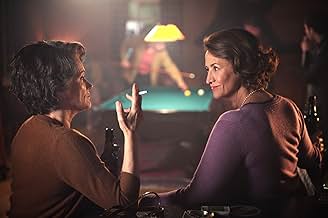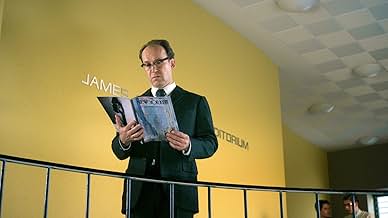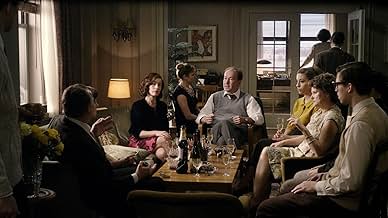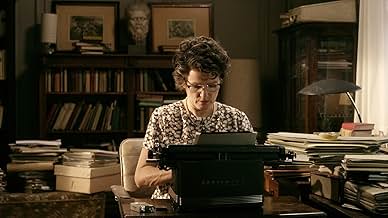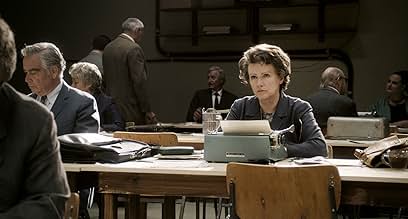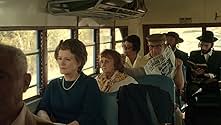AVALIAÇÃO DA IMDb
7,1/10
12 mil
SUA AVALIAÇÃO
Um olhar sobre a vida da filósofa e teórica política Hannah Arendt, que relatou para The New Yorker sobre o julgamento do líder nazi Adolf Eichmann em Jerusalém.Um olhar sobre a vida da filósofa e teórica política Hannah Arendt, que relatou para The New Yorker sobre o julgamento do líder nazi Adolf Eichmann em Jerusalém.Um olhar sobre a vida da filósofa e teórica política Hannah Arendt, que relatou para The New Yorker sobre o julgamento do líder nazi Adolf Eichmann em Jerusalém.
- Direção
- Roteiristas
- Artistas
- Prêmios
- 8 vitórias e 18 indicações no total
Leila Lallali
- Student Laureen
- (as Leila Schaus)
- Direção
- Roteiristas
- Elenco e equipe completos
- Produção, bilheteria e muito mais no IMDbPro
Avaliações em destaque
Folks, this is what Philosophy is all about: taking a stand which is not always popular and being able to justify it for the ages. Hannah Arendt is only in this century beginning to receive her due as the most perspicuous political philosopher of the 20th century. After all, it was Ms Arendt who first observed that post-Hiroshima, a conventional war could never again be fought and won. But rather, all pre-emptive invasions who devolve into occupations - that rather than full-scale war or revolutions - the world would sink increasingly into a mire of entropic violence. Her controversial thesis in Eichmann In Jerusalem - yet another masterpiece of at least five in her canon, is that mass atrocities are not committed by idiosyncratic madmen who erect vast engines of evil in which the followers (citizens of the state) serve as the 'cogs' – but rather the architectonic of evil consists in the actions of rather ordinary people who for various reasons and rationalizations refuse to think about the ramifications of what they're doing. I mention this point because I've studied Ms Arendt's work for over three decades, lived in Greenwich Village when she was teaching at the New School, and when I saw the film premiere at the Santa Barbara Film Festival this past January – I felt that most of the scant audience did not get the point any more than her contemporaries. The film-making is excellent. To dramatize philosophic ideas is challenge in itself. Von Trotta, in the old European style, makes her films with a regular group of actors, and, while the performances were effective throughout, in real life, Hannah Arendt was not nearly so physically engaging and Mary McCarthy quite a bit more – which, I believe had something to do with the development their respective moral characters. All in all, a great, not merely a good, film – and one of the few worth seeing thus far this year – unless, of course, the attributes of fast and furious 6 or iron man 3 overwhelm.
An intense look at the trouble life of philosopher and political theorist Hannah Arendt , who reported for The New Yorker on the war crimes trial of the Nazi Adolf Eichmann . It deals with her American personal experiences , as in 1950 , Hanna (Barbara Sukowa) became a naturalized citizen of the United States along with her husband Heinrich Blucher (Axel Milberg) . Arendt served as a visiting scholar at the University of California, Berkeley, Princeton University, and Northwestern University. In the spring of 1959, she became the first woman lecturer at Princeton ; Arendt also taught at the University of Chicago , The New School in Manhattan and Yale University . Furthermore , in the movie appears some flashbacks about her relationship with Martin Heidegger (Klaus Pohl) . Hanna was was a German-American political theorist as well as a prestigious philosopher . Arendt's work deals with the nature of power, and the subjects of politics, direct democracy, authority, and totalitarianism.
This is a brooding and thought-provoking biographic drama about the notorious philosopher focusing mainly the Eichman trial . Stands out the wonderful acting by Barbara Sukowa who is terrific in the title role . Support cast is frankly excellent such as Axel Milberg as her husband Heinrich Blucher , Janet McTeer as the writer Mary McCarthy and Julia Jentsch as her helper , the latter also starred another good film about Nazism titled ¨Sophie Scholl¨ . The motion picture was well directed by Margarethe Von Trotta and it belongs a trilogy dealing with Nazism , formed by ¨Roxa Luxemburg¨ also starred by Barbara Sukowa and ¨Rosenstrasse¨or Street of roses .
The picture is based on real events about Hanna Arendt life ; Arendt's first major book was entitled, The Origins of Totalitarianism (1951), which traced the roots of Stalinist Communism and Nazism in both anti-Semitism and imperialism . In her reporting of the Eichmann trial for The New Yorker, which evolved into Eichmann in Jerusalem : A Report on the Banality of Evil (1963), she coined the phrase "the banality of evil" to describe Eichmann. She raised the question of whether evil is radical or simply a function of thoughtlessness, a tendency of ordinary people to obey orders and conform to mass opinion without a critical evaluation of the consequences of their actions and inaction.Arendt was sharply critical of the way the trial was conducted in Israel. She also was critical of the way that some Jewish leaders, notably M. C. Rumkowski, acted during the Holocaust. This caused a considerable controversy and even animosity toward Arendt in the Jewish community. Her friend Gershom Scholem, a major scholar of Jewish mysticism, broke off relations with her. Arendt was criticized by many Jewish public figures, who charged her with coldness and lack of sympathy for the victims of the Shoah/Holocaust. Due to this lingering criticism, her book has only recently been translated into Hebrew.
This is a brooding and thought-provoking biographic drama about the notorious philosopher focusing mainly the Eichman trial . Stands out the wonderful acting by Barbara Sukowa who is terrific in the title role . Support cast is frankly excellent such as Axel Milberg as her husband Heinrich Blucher , Janet McTeer as the writer Mary McCarthy and Julia Jentsch as her helper , the latter also starred another good film about Nazism titled ¨Sophie Scholl¨ . The motion picture was well directed by Margarethe Von Trotta and it belongs a trilogy dealing with Nazism , formed by ¨Roxa Luxemburg¨ also starred by Barbara Sukowa and ¨Rosenstrasse¨or Street of roses .
The picture is based on real events about Hanna Arendt life ; Arendt's first major book was entitled, The Origins of Totalitarianism (1951), which traced the roots of Stalinist Communism and Nazism in both anti-Semitism and imperialism . In her reporting of the Eichmann trial for The New Yorker, which evolved into Eichmann in Jerusalem : A Report on the Banality of Evil (1963), she coined the phrase "the banality of evil" to describe Eichmann. She raised the question of whether evil is radical or simply a function of thoughtlessness, a tendency of ordinary people to obey orders and conform to mass opinion without a critical evaluation of the consequences of their actions and inaction.Arendt was sharply critical of the way the trial was conducted in Israel. She also was critical of the way that some Jewish leaders, notably M. C. Rumkowski, acted during the Holocaust. This caused a considerable controversy and even animosity toward Arendt in the Jewish community. Her friend Gershom Scholem, a major scholar of Jewish mysticism, broke off relations with her. Arendt was criticized by many Jewish public figures, who charged her with coldness and lack of sympathy for the victims of the Shoah/Holocaust. Due to this lingering criticism, her book has only recently been translated into Hebrew.
Although I was not familiar with the name "Hannah Arendt," I was certainly familiar with the phrase "banality of evil" that Arendt coined. However, "banality of evil" is not the phrase she used. The full phrase is "the fearsome, word-and-thought-denying banality of evil." Because, unlike the claims of many accusers who didn't fully understand her, Arendt didn't see a simple bureaucrat in Eichmann during his 1960 trial in Israel. She saw a truly evil man who "spoke like a bureaucrat." Her point being that Eichmann did not speak or seem to think like a genocidal maniac yet he acted like one nevertheless. That is evil cloaked in the banal. This movie revolves around the years of Arendt's life, 1960 to 1963, when she was formulating these ideas and in that, I think the movie probably has it right.
All that said, and these are certainly ideas worth mulling over, this is a film for ideas and for philosophy buffs, not for film buffs. Why do I say this? Because this movie is slow, at least for American audiences. The beginning is confusing. We see a woman in New York but we don't know the date. She speaks German. We see a man get off of a bus heading to "Victoria" in the middle of nowhere. He is promptly kidnapped. We don't know when or where. Eventually, we learn the kidnapped man is Adolph Eichmann who is nabbed by the Mossad in Argentina in 1960. Much of the movie unfolds slowly. This is a film about thinking. It is not about doing much or feeling much. It is an intellectual film.
There's one semi-action scene in the film where a 1950s vehicle corners Arendt on the road where she is walking. Israeli secret agents pour out of the car and threaten Arendt, trying to prevent her from publishing her book about Eichmann. Based on someone knowledgeable, Professor Roger Berkowitz, academic director of the Hannah Arendt Center for Politics and the Humanities at Bard College in New York, it appears this scene was invented out of whole cloth to try to give the film at least some suspense. But that's not what this film is about.
It's about thinking and it's about the fearsome, word-and-thought-denying banality of evil and how Hannah Arendt was the first to identify this 20th-century pathology of the human psyche.
Thanks to the Camera Cinema Club in San Jose for showing this film.
All that said, and these are certainly ideas worth mulling over, this is a film for ideas and for philosophy buffs, not for film buffs. Why do I say this? Because this movie is slow, at least for American audiences. The beginning is confusing. We see a woman in New York but we don't know the date. She speaks German. We see a man get off of a bus heading to "Victoria" in the middle of nowhere. He is promptly kidnapped. We don't know when or where. Eventually, we learn the kidnapped man is Adolph Eichmann who is nabbed by the Mossad in Argentina in 1960. Much of the movie unfolds slowly. This is a film about thinking. It is not about doing much or feeling much. It is an intellectual film.
There's one semi-action scene in the film where a 1950s vehicle corners Arendt on the road where she is walking. Israeli secret agents pour out of the car and threaten Arendt, trying to prevent her from publishing her book about Eichmann. Based on someone knowledgeable, Professor Roger Berkowitz, academic director of the Hannah Arendt Center for Politics and the Humanities at Bard College in New York, it appears this scene was invented out of whole cloth to try to give the film at least some suspense. But that's not what this film is about.
It's about thinking and it's about the fearsome, word-and-thought-denying banality of evil and how Hannah Arendt was the first to identify this 20th-century pathology of the human psyche.
Thanks to the Camera Cinema Club in San Jose for showing this film.
Other reviewers have questioned the historical accuracy of Margarethe von Trotta's portrayal of Hannah Arendt (Barbara Sukowa) and her opinion of the Jewish leaders as expressed in her NEW YORKER articles on the trial of Adolf Eichmann in 1961.
As a piece of film-making, however, HANNAH ARENDT grabs the attention and does not let go throughout its 113-minute running- time. As portrayed by Sukowa, Arendt comes across as a forthright person, not frightened of expressing her opinions and responding to any intellectual challenges from close friends such as Kurt Blumenfeld (Michael Degen). Yet beneath that tough surface lurks a profoundly disillusioned person, as she discovers to her cost that her great teacher and mentor Martin Heidegger (Klaus Pohl) does not practice what he preaches. Although insistent on reinforcing the distinction between "reason" and "passion," Heidegger takes the "passionate" decision to associate himself with the Nazi party, and thereby embraces their totalitarian values. Like Eichmnann himself, he chooses not to "think" but to commit himself to an ideology that actively discourages individual thought.
The sense of shock and disillusion Arendt experiences inevitably colors her view of the Eichmann trial. Director von Trotta includes several close-ups of her sitting in the press-room listening to the testimony of Eichmann, his accusers and the witnesses, a quizzical expression on her face, as if she cannot quite make sense of what she hears. She cannot condemn Eichmann, because he has simply followed Heidegger's course of action.
Once the articles have been published, Arendt experiences an almost unprecedented campaign of vilification. Although she is given a climactic scene where she defends herself in front of her students (and her accusers within the university faculty), we get the sense that she is only doing so on the basis of abstractions; her personal feelings are somehow disengaged. She is far more affected when her one-time close friend Hans Jonas (Ulrich Noethen) vows never to talk to her again on account of her views. Philosophers might be able to make sense of the world, but they often neglect human relations.
Consequently our view of Arendt, as portrayed in this film, is profoundly ambivalent. While empathizing with her views about the banality of evil, which reduces people to automata as they claim they were only carrying out orders, even while being involved in atrocities, Arendt herself comes across as rather myopic, so preoccupied with her ideas that she has little or no clue about how they might affect those closest to her. It's a wonder, therefore, that Mary McCarthy (Janet McTeer) chooses to stick with her through the worst of circumstances.
Ingeniously combining archive footage of the Eichmann trial with color re-enactments of what happened during that period, HANNAH ARENDT is a thought-provoking piece, even if we find it difficult to identify with the central character.
As a piece of film-making, however, HANNAH ARENDT grabs the attention and does not let go throughout its 113-minute running- time. As portrayed by Sukowa, Arendt comes across as a forthright person, not frightened of expressing her opinions and responding to any intellectual challenges from close friends such as Kurt Blumenfeld (Michael Degen). Yet beneath that tough surface lurks a profoundly disillusioned person, as she discovers to her cost that her great teacher and mentor Martin Heidegger (Klaus Pohl) does not practice what he preaches. Although insistent on reinforcing the distinction between "reason" and "passion," Heidegger takes the "passionate" decision to associate himself with the Nazi party, and thereby embraces their totalitarian values. Like Eichmnann himself, he chooses not to "think" but to commit himself to an ideology that actively discourages individual thought.
The sense of shock and disillusion Arendt experiences inevitably colors her view of the Eichmann trial. Director von Trotta includes several close-ups of her sitting in the press-room listening to the testimony of Eichmann, his accusers and the witnesses, a quizzical expression on her face, as if she cannot quite make sense of what she hears. She cannot condemn Eichmann, because he has simply followed Heidegger's course of action.
Once the articles have been published, Arendt experiences an almost unprecedented campaign of vilification. Although she is given a climactic scene where she defends herself in front of her students (and her accusers within the university faculty), we get the sense that she is only doing so on the basis of abstractions; her personal feelings are somehow disengaged. She is far more affected when her one-time close friend Hans Jonas (Ulrich Noethen) vows never to talk to her again on account of her views. Philosophers might be able to make sense of the world, but they often neglect human relations.
Consequently our view of Arendt, as portrayed in this film, is profoundly ambivalent. While empathizing with her views about the banality of evil, which reduces people to automata as they claim they were only carrying out orders, even while being involved in atrocities, Arendt herself comes across as rather myopic, so preoccupied with her ideas that she has little or no clue about how they might affect those closest to her. It's a wonder, therefore, that Mary McCarthy (Janet McTeer) chooses to stick with her through the worst of circumstances.
Ingeniously combining archive footage of the Eichmann trial with color re-enactments of what happened during that period, HANNAH ARENDT is a thought-provoking piece, even if we find it difficult to identify with the central character.
I didn't know an awful lot about philosopher Hannah Arendt before I saw this movie. Now I know a lot more about her, and about the way she thinks. After seeing the film, I have even read some articles about her work.
If that's what director Margarethe von Trotta had in mind when making this film, she succeeded. Her film documents an important chapter in the story of Arendt's life: her articles about the Eichmann trial in Jerusalem, and the ensuing tsunami of negative reactions. The reason for those negative reactions was the way Arendt regarded Eichmann: not as a monster, but as a man 'incapable of thinking', a dimwit who just followed orders. This fitted her theory of 'the banality of evil': the worst kinds of evil are often the result of not thinking for oneself.
Veteran actress Barbara Sukowa portrays Arendt as a difficult and complex woman, who is a brilliant philosopher but also stubborn, arrogant and single-minded. In one scene, we see her lying on a couch, when the phone rings. On the other end of the line is her editor, who faces a deadline and asks if she is making progress with the articles. 'Of course I'm working hard, and it would be nice if I could continue working instead of chatting on the phone', she answers. After that, she returns to the couch, lies down and continues smoking her cigarette.
Sometimes it seems that Arendt is incapable of feeling, just as Eichmann is incapable of thinking. Even when her best friends turn away from her, she continues insulting them by telling them 'she doesn't love the Jewish people'. She means it in a philosophical way - you can't love a people the way you love individuals. But nevertheless, it comes across as cold-hearted and insensitive.
Arendt is clearly an interesting person. But that doesn't make 'Hannah Arendt' an interesting film. From a cinematographic point of view, the movie doesn't have much to offer. It's a rather straightforward account of this episode in Arendt's life. The only thing that adds a little depth to the film are the flashbacks of the romantic affair she had with her teacher, the famous philosopher Martin Heidegger, who sympathized with the Nazis. The film suggests that this affair influenced the way she regarded Nazis such as Eichmann, but doesn't make this explicit. In my view, the film is interesting as a history lesson about this remarkable woman, but not as a great cinematographic experience.
If that's what director Margarethe von Trotta had in mind when making this film, she succeeded. Her film documents an important chapter in the story of Arendt's life: her articles about the Eichmann trial in Jerusalem, and the ensuing tsunami of negative reactions. The reason for those negative reactions was the way Arendt regarded Eichmann: not as a monster, but as a man 'incapable of thinking', a dimwit who just followed orders. This fitted her theory of 'the banality of evil': the worst kinds of evil are often the result of not thinking for oneself.
Veteran actress Barbara Sukowa portrays Arendt as a difficult and complex woman, who is a brilliant philosopher but also stubborn, arrogant and single-minded. In one scene, we see her lying on a couch, when the phone rings. On the other end of the line is her editor, who faces a deadline and asks if she is making progress with the articles. 'Of course I'm working hard, and it would be nice if I could continue working instead of chatting on the phone', she answers. After that, she returns to the couch, lies down and continues smoking her cigarette.
Sometimes it seems that Arendt is incapable of feeling, just as Eichmann is incapable of thinking. Even when her best friends turn away from her, she continues insulting them by telling them 'she doesn't love the Jewish people'. She means it in a philosophical way - you can't love a people the way you love individuals. But nevertheless, it comes across as cold-hearted and insensitive.
Arendt is clearly an interesting person. But that doesn't make 'Hannah Arendt' an interesting film. From a cinematographic point of view, the movie doesn't have much to offer. It's a rather straightforward account of this episode in Arendt's life. The only thing that adds a little depth to the film are the flashbacks of the romantic affair she had with her teacher, the famous philosopher Martin Heidegger, who sympathized with the Nazis. The film suggests that this affair influenced the way she regarded Nazis such as Eichmann, but doesn't make this explicit. In my view, the film is interesting as a history lesson about this remarkable woman, but not as a great cinematographic experience.
Você sabia?
- CuriosidadesFor a deeper understanding of this story, one might care to watch Operação Final (2018), which depicts the undercover mission to find and extract Adolf Eichmann from Argentina and bring him to trial in Israel. Showing the background of an operation sanctioned by PM David Ben-Gurion, the film gives a glimpse of the complexity of Eichman's character, his futile attempts to justify his actions and tell his side of the story.
- Erros de gravaçãoWhen Arendt stands on the terrace of her hotel in Jerusalem at looks across the Valley of Hinnom at the Old City, there are Israel flags flying from the Tower of David complex. However, the Old City of Jerusalem was still under Jordanian control in 1961.
- Citações
Hannah Arendt: You describe a book I never wrote.
Siegfried Moses: A book that will never be allowed in Israel. And won't appear anywhere else either if you have any decency left.
Hannah Arendt: You ban books, and lecture me about decency!
- ConexõesFeatured in Kino Kino: Hannah Arendt (2013)
Principais escolhas
Faça login para avaliar e ver a lista de recomendações personalizadas
- How long is Hannah Arendt?Fornecido pela Alexa
Detalhes
- Data de lançamento
- Países de origem
- Central de atendimento oficial
- Idiomas
- Também conhecido como
- Hannah Arendt
- Locações de filme
- Empresas de produção
- Consulte mais créditos da empresa na IMDbPro
Bilheteria
- Faturamento bruto nos EUA e Canadá
- US$ 717.205
- Fim de semana de estreia nos EUA e Canadá
- US$ 31.270
- 2 de jun. de 2013
- Faturamento bruto mundial
- US$ 8.880.936
- Tempo de duração
- 1 h 53 min(113 min)
- Cor
- Mixagem de som
- Proporção
- 2.35 : 1
Contribua para esta página
Sugerir uma alteração ou adicionar conteúdo ausente





